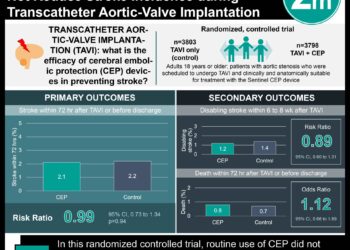[Physician Comment] Increased autism diagnoses observed in pregnant women with viral influenza, fever or using antibiotics
Image: CC. Autism Ribbon.
Study author Dr. Hjördis Ósk Atladόttir, MD, PhD, talks to 2 Minute Medicine Department of Public Health – Institute of Epidemiology and Social Medicine, Aarhus University, Aarhus, Denmark
 “An important message is that even though we find an increased risk of infantile autism after influenza and prolonged periods of fever during pregnancy, the study is still speculative. We made 106 adjusted comparisons; thus, the few statistically significant associations observed could be chance findings.
“An important message is that even though we find an increased risk of infantile autism after influenza and prolonged periods of fever during pregnancy, the study is still speculative. We made 106 adjusted comparisons; thus, the few statistically significant associations observed could be chance findings.
Also, it is important to emphasize that the background prevalence of infantile autism is 0.4%. So even if the risk is twofold or threefold in the exposed group, you only end up with a prevalence of around 1%. Thus, around 99% of women reporting to have had influenza or fever during pregnancy do NOT have children with autism. We do not want pregnant women to worry.
Our results are explorative and we cannot make clinical implications based on these results. Thus, we do not recommend pregnant women to do anything different from what they are used to. If they need antibiotics, they should take antibiotics. If they want to get an influenza vaccination to avoid influenza, they should do so. However, we have no proof that influenza vaccine protects against autism.
This study adds important academic knowledge to the search for autism causes. We emphasize the need for further research on this important topic.”
Key study points:
- Women who self-reported viral influenza during pregnancy had a twofold increased risk of having a child diagnosed with infantile autism than those who did not report having influenza.
- Women experiencing a febrile episode for > 7 days had 1.5 times and three times the risk of having a child diagnosed with ASD and infantile influenza, respectively, than those who did have febrile episodes of the same length.
- A small increase in risk of ASD was noted for women using antibiotics during pregnancy.
Primer: In attempting to ensure appropriate fetal development, maternal health is of primary concern. There is substantial research supporting the connection between maternal infection during pregnancy and psychiatric disorders, including schizophrenia and autism spectrum disorder (ASD). Impaired neuronal cell proliferation, migration, and synapse establishment along with the presence of maternal pro-inflammatory cytokines are proposed as potential in-utero infectious insults to the developing fetus that might contribute to psychiatric diagnoses. The current study adds to previous research in investigating the potential association between common maternal infections, maternal fever, maternal antibiotic use, and the diagnosis of ASD in childhood.
Background reading:
1. Maternal infection requiring hospitalization during pregnancy and autism spectrum disorders [Journal of Autism and Developmental Disorders]
2. The neurodevelopmental impact of prenatal infections at different times of pregnancy: The earlier the worse? [The Neuroscientist]
3. Understanding and determining the etiology of autism [Cellular and Molecular Neurobiology]
This [population-based cohort] study: 96736 children 8-14 years old were drawn from the Danish National Birth Cohort. Their mothers were interviewed regarding infection exposure, fever, and antibiotic use at 17 and 32 weeks into the pregnancy and again when the children were 6 months of age. Diagnoses of ASD were taken from the Danish Psychiatric Central Register, a register with ASD prevalence equivalent to that found in the United States.
There was no association between reports of common infections and ASD. No increase in risk of ASD diagnosis was seen with infection during particular trimesters of pregnancy. There was an increase in risk observed in infantile autism, symptoms of ASD diagnosed under the age of 3 years old, following infection with influenza (adjusted hazard ratio of 2.3, 95% CI). There was a significantly increased risk of ASD and infantile autism in women who had fevers for > 1 week (adjusted hazard ratio: 1.6, 3.2, respectively, 95% CI). An increased risk of infantile autism was seen in women who used macrolides during the pregnancy (adjusted hazard ratio of 2.2, 95% CI).
In sum: The current exploratory study highlights possible increased risk of autism diagnoses associated with viral influenza, long febrile episodes, and antibiotic use during pregnancy. While this study combines a large amount of data along with reliable ASD diagnoses, the fact that the study results included multiple adjusted comparisons along with influenza, febrile episodes, and antibiotic being self-reported makes it difficult to draw definitive conclusions. In addition, the presence of fever and antibiotic use may not be separate contributors, but proxies for infectious processes, to autism diagnoses. Authors of the current study make a point of highlighting that any increase in autism prevalence attributed to influenza, fever, and antibiotics is small and additional research must be completed before any results may be used in the clinical care of pregnant patients.
Click to read the study in Pediatrics
By [LHC] and [MS]
More from this author: Nutrient-enriched formula linked to increased head circumference and lower fat mass in a subset of preterm infants; Prophylactic probiotic use trends toward decreased incidence of nosocomial infections in preterm infants; Increases in CT scan usage in children with abdominal pain were not accompanied by changes in hospital admission rates or appendicitis diagnosis rates
© 2012 2minutemedicine.com. All rights reserved. No works may be reproduced without written consent from 2minutemedicine.com. Disclaimer: We present factual information directly from peer reviewed medical journals. No post should be construed as medical advice and is not intended as such by the authors or by 2minutemedicine.com. PLEASE SEE A HEALTHCARE PROVIDER IN YOUR AREA IF YOU SEEK MEDICAL ADVICE OF ANY SORT.




